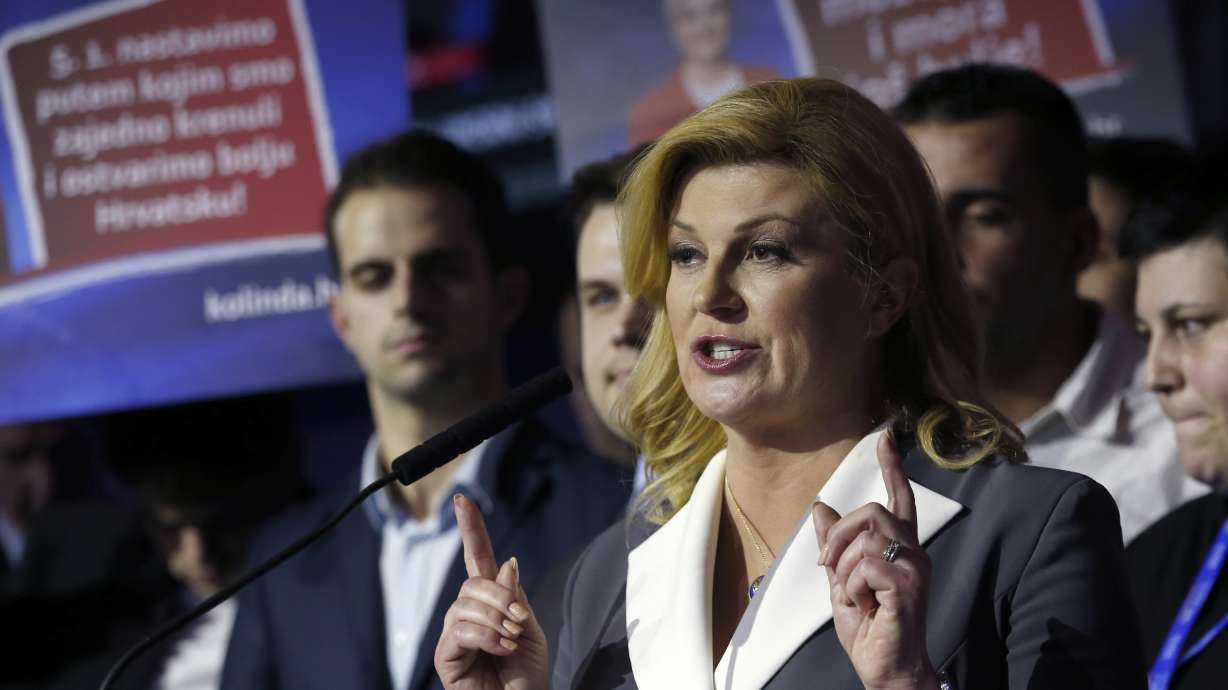Estimated read time: 3-4 minutes
This archived news story is available only for your personal, non-commercial use. Information in the story may be outdated or superseded by additional information. Reading or replaying the story in its archived form does not constitute a republication of the story.
ZAGREB, Croatia (AP) — Croatia's bitterly contested presidential race is headed for a runoff this weekend to decide whether a conservative or a liberal will become the new head of state while the country holds the European Union presidency for the first time.
Incumbent President Kolinda Grabar Kitarovic from the governing conservative party is facing leftist former Prime Minister Zoran Milanovic in what analysts say could be a highly unpredictable and tight vote on Sunday.
The two made it into the runoff following the first round of voting on Dec. 22. Milanovic had a slight lead over Grabar Kitarovic, but opinion polls suggest there's no clear favorite.
Here's a look at what's at stake at the ballot:
THE PRESIDENT'S ROLE IN CROATIA
It is a largely ceremonial post compared to the prime minister, who holds more actual power, yet the president still formally commands the army and represents the country abroad.
However, the president is chosen in a direct public vote, which gives the head of state additional political weight and a important voice on key topics in society.
WHY IS SUNDAY'S VOTE IMPORTANT?
This presidential election is important because it could shake up the political scene in Croatia during a crucial EU presidency that will include presiding over Britain's departure from the bloc and the start of post-Brexit trade negotiations. The EU presidency rotates among the bloc's 28 members every six months, and since Croatia only joined the EU in 2013, this is the country's first time at the helm.
The vote also is a test for the ruling Croatian Democratic Union party ahead of this year's parliamentary election. An opposition victory on Sunday from Croatia's 3.8 million voters would be a blow for the conservatives, weakening their grip on power.
Croatia took over the EU presidency on Jan 1. The European Commission members will visit Zagreb on Jan. 9.
WHAT DID THE FIRST ROUND LOOK LIKE?
Milanovic came out ahead after the first round of balloting, trailed by Grabar Kitarovic and right-wing singer Miroslav Skoro, who garnered nearly a quarter of the vote with his anti-establishment, nationalist campaign.
It's not clear how Skoro's support will distribute in the runoff. He has not backed any of the candidates and vowed to render his own ballot void on Sunday. Analysts say Skoro's votes could go both ways, although Grabar Kitarovic is ideologically closer.
WHO IS RUNNING?
The 51-year-old, U.S.-educated Grabar Kitarovic had a diplomatic career before becoming Croatia's first female president in 2015. She has sought to portray herself as a pan-national figure who relates to all Croats, but has raised eyebrows for flirting with the extreme right.
In a bid to lure Skoro's right-wing voters, Grabar Kitarovic evoked the Croatian unity during the 1991-95 war that followed the split from the Serb-led Yugoslavia. She was mocked in the first round because of a series of gaffes during the campaign.
The 53-year-old Milanovic is backed by Croatia's liberal opposition parties, including his Social Democrats, but liberals have been struggling to regain clout in the predominantly right-leaning nation.
Prone to populist outbursts while prime minister, Milanovic now says he has learned from the experience and matured. He tells the voters to give him a chance to surprise them.
KEY FACTS ABOUT CROATIA
Home to 4.2 million people, Croatia joined the EU after coming out of a devastating war in the 1990s that left over 10,000 people dead and stalled economic and other reforms.
Although a lot of time has passed since the war, Croatia's economy still has catching up to do with the rest of the EU and corruption is believed to be widespread. That is why many Croats, especially young people, have been leaving for more opportunities in other EU nations.
The war remains a politically relevant topic in Croatia, a predominantly conservative nation where the Catholic Church plays an important role.
Copyright © The Associated Press. All rights reserved. This material may not be published, broadcast, rewritten or redistributed.









